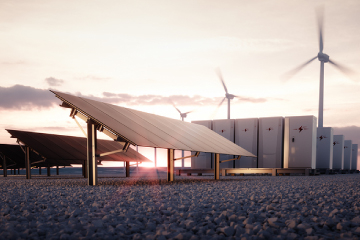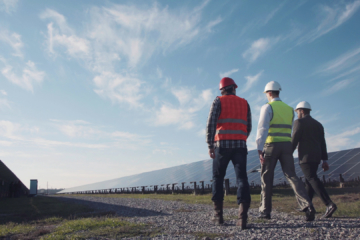- About UsAbout UsWe’re committed to providing future generations with the means to power their lives in the most economic, environmental and socially responsible ways possible.
- What We DoWhat We DoWe are a market-leading, independent power producer and service provider, delivering: wind (onshore and offshore), solar photovoltaic, storage, and electrical vehicle charging.
- Landowners
- Suppliers
- Projects
- Careers
- News
- Contact
Measuring What Matters: A Foundation for Increased Environmental Sustainability

By James Flores, Environment & Sustainability Manager
At EDF Renewables, environmental sustainability and corporate responsibility are part of our DNA. We are dedicated to creating a clean energy future by building and operating renewable energy projects across North America that will deliver lasting benefits to the environment, the economy and local communities.
In that spirit, we recently produced our first report on environmental, social and governance (ESG) issues. The reporting process helped us identify ways in which we can deepen and refine our approach to ESG matters, and in response we have launched several initiatives with an eye to expanding the information we include in future reports.
The first initiative is a comprehensive assessment of our greenhouse gas (GHG) footprint across Canada, and the US. The first step is to establish our baseline emissions, which will be based on our activities from 2019-2022. This will enable us to report on Scope 1 and 2 GHG emissions in our next report, after which we intend to look at opportunities to reduce selected Scope 3 emissions such as fuel consumption, business travel and purchased goods and services.

A second area of focus is our water consumption and discharge. We are in the early stages of establishing a system to track these metrics at all grid-scale wind, solar and battery storage sites in the US and Canada in which EDF Renewables has an ownership stake, which in turn will help us manage this resource.
Waste is a third area of focus, and one that receives considerable attention within EDF Renewables. Since 2019, we have tracked our materials consumption from “cradle to grave” in the US and Canada, which has provided meaningful insights and allowed us to reduce the amount of waste we produce. To further enhance these efforts, we have created working groups to examine the lifecycle impacts of our wind, solar and battery storage projects. These multi-dimensional teams are composed of individuals from our business development, supply chain/procurement and Health, safety, and Environment departments who are working collaboratively to find recycling solutions to minimize or eliminate the need to send waste to landfills in the future.
Overall, we are excited by the opportunity to expand tracking of our environmental impacts and find ways to make our existing programs even more robust. The passage of the Inflation Reduction Act (IRA) in August 2022 provided significant clarity to the renewable energy industry; this will drive greater investment and represents an important step toward reducing the carbon intensity of our energy sector. We are eager to help fulfill the IRA’s potential by delivering gigawatts of renewable energy projects over the next several years.
That said, we recognize that the clean energy transition depends on a shared understanding of the risks and tradeoffs associated with climate change. Fostering a national vision of the climate, environmental, economic and national security benefits associated with renewable energy projects and enhanced transmission infrastructure requires clear communication, transparency and accountability – all core tenets of ESG reporting. We look forward to contributing to the public dialogue on these topics and sharing our progress on ESG issues with our stakeholders.
Post a Comment Cancel reply
- © 2025 EDF Renewables North America
- Privacy Policy
- AB 1305 Disclosure
- TCFD Report



Comments (1)
Great initiative.